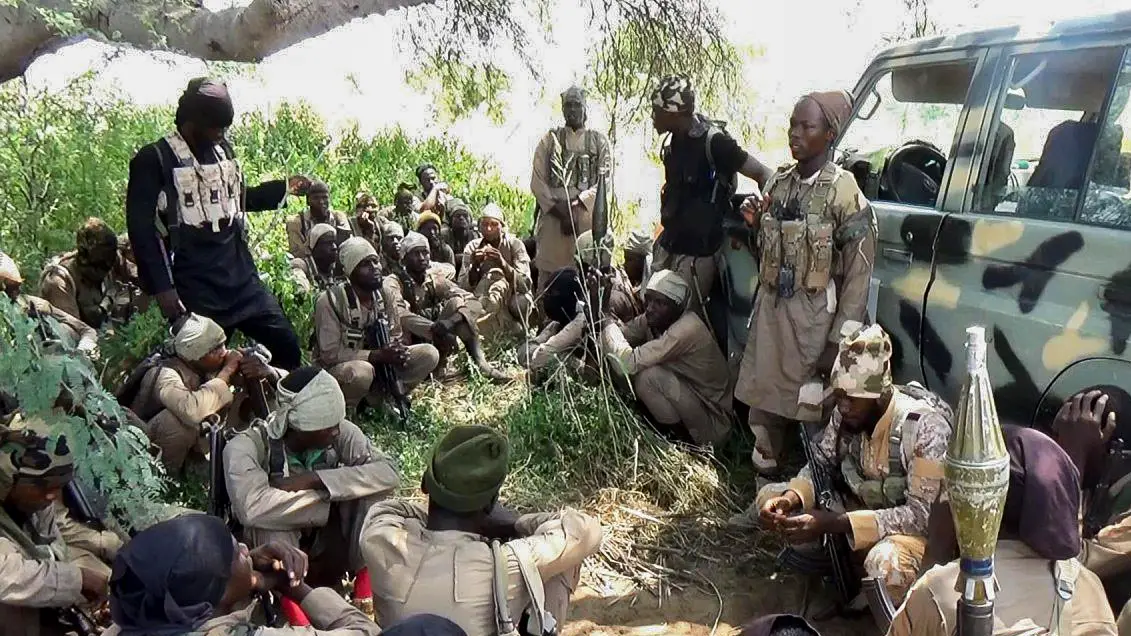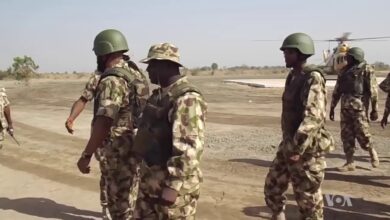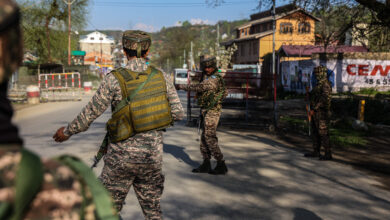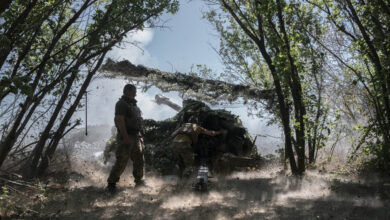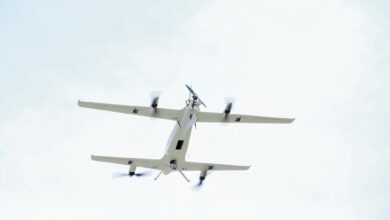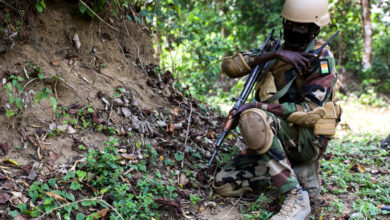At least four Nigerian soldiers and a militia fighter were killed in clashes with Islamic State West Africa Province fighters in northeast Nigeria’s Borno state, security sources told AFP on Sunday.
Fighting erupted late on Saturday, October 19 when troops ambushed an ISWAP convoy near Jakana, which is around 40 km (25 miles) west of Borno state capital Maiduguri.
“We lost four soldiers and a member of the vigilante group in the fighting,” a military officer said in reference to a militia in the region.
“The terrorists came in large numbers and our troops fought gallantly but they were overwhelmed,” added the officer who asked not to be identified for fear of sanction.
Several troops were also injured and four trucks were lost to the militants, he said.
The insurgents were riding in pickup trucks fitted with machine guns according to a militiaman who confirmed the death toll.
ISIS in Saturday statement claimed ISWAP fighters attacked a military base in Jakana. It said they clashed with troops for several hours, killing 10 and injuring others, and that three four-wheel-drive vehicles were captured.
‘Tactical boomerang’
In a Sunday statement, the Nigerian Army said seven “marauding Boko Haram criminals” were killed and eight injured when their vehicle hit a roadside bomb as they were “escaping the unbearable battle heat” near Jakana on Friday.
The improvised explosive device had been planted by the insurgents in Lamba’a Forest, along the Jakana to Mainok Road, army spokesperson Colonel Aminu Iliyasu said in the statement, describing the blast a “tactical boomerang.”
In July, ISWAP militants were blamed for an attack on a military base in Jakana that followed the ambush of a military vehicle nearby in which six soldiers were reportedly killed.
Jakana lies on a 120-km highway that links Maiduguri and Damaturu, the capital of Yobe state.
Although ISWAP’s main area of operations is further east in the Lake Chad area, the group has attacked a number of military locations in the Maiduguri-Biu-Damuturu triangle in recent months. In late July, ISIS claimed ISWAP fighters killed 25 Nigerian troops in Benisheikh and earlier that month claimed ISWAP fighters fought off a Nigerian military assault in the Damboa area.
On October 3, a military source told AFP that ISWAP fighters killed 11 soldiers and injured 16 when they ambushed a military convoy in Benisheikh district.
Premium Times reported that 34 members of 154 Task Force Battalion who were on patrol in the Mauli–Borgozo area, south of Benisheikh, when they were ambushed at around 11:25 a.m.
Islamic State did not claim responsibility for the ambush, but did claim on October 3 that ISWAP fighters “set up a checkpoint on the road between the city of Maiduguri and the town of Benisheikh in the Borno region,” capturing and killing a Christian.
A week earlier, ISIS claimed 17 Nigerian Army soldiers were killed and seven vehicles destroyed on September 27 by ISWAP fighters near Buni Yadi in Yobe state, which is around 80 km southwest of Benisheikh,
In a statement ISIS claimed ISWAP fighters attacked a military base in the town, prompting soldiers to withdraw south towards Buratai. The statement claimed the withdrawing soldiers were hit by six IEDs that had previously been planted on the road, killing 17 and injuring others.
Militia sources had told AFP that six people were killed the previous day when their car hit a land mine outside Kamuya village, which is
The home village of Chief of Army Staff Lieutenant General Tukur Yusuf Buratai’s mother according to AFP, Kamuya has seen a number of violent events this year, most recently on September 6, when at least one soldier was killed and three others injured in an ambush on a military convoy near Kamuya. The following day, ISIS claimed ISWAP fighters had killed two soldiers in an attack near Buratai.
A decade of Islamist insurgency
The jihadist group known as Boko Haram began its bloody insurgency in northeastern Nigeria in 2009, but it has since spread into neighboring Niger, Chad and Cameroon, prompting a regional military response.
Boko Haram split into two factions in mid-2016. One, led by long-time leader Abubakar Shekau, is notorious for suicide bombings and indiscriminate killings of civilians. Shekau pledged allegiance to ISIS leader Abu Bakr Al-Baghdadi in March 2015, but ISIS central only gives formal backing to the other faction, which it calls Islamic State West Africa Province.
The ISWAP faction, which largely focuses on attacking military and government targets, was led by Abu Mus’ab Al-Barnawi, but in March, audio recordings revealed that ISIS appointed Abu Abdullah Idris bin Umar, also known as Ibn Umar al-Barnawi and Ba Idrisa, as ISWAP leader. ISIS has not yet made a public statement confirming the change. On September 10, the United States added Ba Idrisa to its Specially Designated Global Terrorist list, but did not specify which faction he belongs to.
The U.S. assesses that Boko Haram and ISWAP are responsible for more than 35,000 deaths since 2011. More than two million people have been displaced by the conflict, sparking a dire humanitarian crisis in the region. Earlier this month, the International Committee of the Red Cross said that nearly 22,000 people, mostly children, are missing as a result of the northeast Nigeria insurgency.
Buratai in May said Boko Haram was defeated and the Nigerian military is now fighting what he reportedly described as an international criminal gang known as ISWAP. In July, a spokesperson for President Muhammadu Buhari again insisted that Boko Haram was defeated, blaming ongoing violence in the northeast on international jihadists that were exploiting porous borders with Sahel countries.
On September 13, the army said Buratai had warned that referring to Boko Haram, JAS or ISWAP by name “could amount to supporting or encouraging terrorism,” and that “giving prominence to the criminal activities of the terrorists group through sensational headlines and fake news in both electronic and print media could also amount to tacit support to terrorism which violates the Terrorism Prevention Act 2011.”
With reporting from AFP

